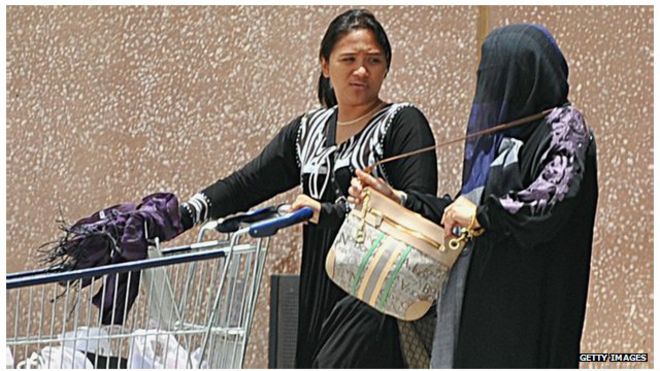Filipinos call for ban on maids to Mideast
Amidst increasing rape cases and abuses against Filipinos in Kuwait, several Filipino organizations here called for an immediate suspension and a ban on sending household service workers to Kuwait and the rest of the region.http://news.kuwaittimes.net/filipinos-call-for-ban-on-maids-to-mideast/
On Thu, Mar 5, 2015 at 2:22 PM, Isha Khan <bdmailer@gmail.com> wrote:
Exporting maids to Saudi Arabia needs a second thoughtShamsul HudaBangladesh is set to export maids to Saudi Arabia. This decision may turn out to be a misstep with the possibility of losing again the 'rediscovered' labour market which was out of the reach for Bangladeshis for around seven years due to their alleged involvement in unlawful activities.http://www.observerbd.com/2015/02/27/74878.php
Unlike male workers, maids export is troublesome. They are from poor families and deployed in a new opulent environment with many modern household appliances quite unknown to them. Most importantly, there are risks of insecurity, ill-treatment, long working hours, non-payment of wages and forced involvement in immoral activities.
There is sheer scope of debauchery by maids not necessarily with the involvement of the members of their employers' families, but most likely with their own country's male workers who are abundantly available around them. These male workers, mostly bachelors and those who are married are away from their homes for a long time, generally for two years, are likely to lure these maids away from their employers' houses and subsequently these maids will be registered as runaways.
Runaway is an acute predicament in Saudi Arabia and it prompts several maid supplying countries to either put a stop to the exports of domestic helpers or to toughen the procedures and conditions for their deployment. When contacted by this writer, the diplomatic missions of the major maid exporting countries to the Kingdom like Indonesia, Philippines and Sri Lanka have confirmed that there is a severe runaway problem and they are finding it difficult to deal with it.
Indonesian government has taken a decision to stop sending domestic workers to all Arab countries citing a reason that it is contrary to its country's 'self-esteem and dignity'. The decision came after the newly elected Indonesian President Joko Jokowi Widodo, vowed to make an end to this ignominious practice.
Bangladesh will initially supply an army of 120,000 workforce with a deployment of 10,000 a month. They are mainly maids, housekeepers and drivers. This number is considered a cumin seed in a camel's mouth since the Kingdom is currently in dire need of a huge number of such domestic helpers.
In the face of growing shortage of domestic workers, there has been brisk illegal trade of maids in the Saudi market with a maid being sold between SR30,000 and SR50,000 (SR1=BDT20+). The skyrocketing demand coupled with inhospitable working conditions is increasingly encouraging existing maids to desert their current workplaces to join new employers for higher pays and in the way, many of them are caught in the tangled web of human traffickers who, sometimes, force them to get involved in immoral acts.
To stop maids' defection, the labour ministers of the Gulf Cooperation Council (GCC, of which Saudi Arabia is a member) recently unanimously agreed on certain terms in the contracts of the domestic helpers in order to improve their widely criticised working conditions. The new contracts stipulate that household workers will enjoy a weekly day off, annual leave and the right to live outside their employer's house. Under the contract, domestic helpers are also entitled to end of service indemnity and overtime pay for extra work for a maximum of two hours daily, in addition to banning employers from confiscating their passports.
Saudi Arabia has already put in place tough laws for employers of domestic helpers. First-time violators are fined SR2,000 and a one-year ban on the further recruitment of maids. Second-time violators will be slapped with a fine of SR5,000 with a recruitment ban for three years. And there is stringent punishment for the third-time violators who will risk a lifetime ban and a fine of SR10,000.
On the other hand, if maids breach their contracts, they will be punished with SR2,000 fine and prevented forever from working in the Kingdom and will be liable to pay their repatriation expenses. Under the new regulations, maids are obliged to adhere to Saudi customs, traditions, religious teachings, family values and secrets.
In order to organise its labour market and cope with the growing problems, Saudi Arabia has set up a first-of-its-kind multilingual communication centre to address complaints and grievances of its estimated 1.2 million domestic workers. The centre, well equipped to respond to queries and complaints of maids in eight languages, will also look into disputes between employers and employees in an attempt to resolve them amicably between five and 10 working days. If disputes don't end, plaintiffs can file their complaints to the labour court within 10 days for further action.
Bangladesh should give a second thought before getting into exporting of its maid workers when other suppliers are balking at further deployments of their domestic helpers in Saudi Arabia. Bangladesh should keep in mind that once it had lost the Saudi labour market mainly because of its workers' petty crimes and if domestic helpers are exported in bulk there will undoubtedly be an outbreak of the identical incidents which are likely to add insult to injury if runaway maids are, too, engaged in anti-social activities.
Shamsul Huda is the editor of a Saudi economic journal
2015-03-05 9:55 GMT+06:00 Isha Khan <bdmailer@gmail.com>:
বাংলাদেশে আজ থেকে শুরু হচ্ছে সৌদি যেতে নারীকর্মীদের নিবন্ধন
অতীতেও অনেক নারীই সৌদি আরবে গিয়েছেন, তবে তাদের বেশির ভাগের অভিজ্ঞতাই খুব একটা সুখকর নয়।কিন্তু এরপরও যেসব নারীকর্মীরা সৌদি আরব যেতে আগ্রহী তারা কি এক্ষেত্রে ঝুঁকির বিষয়ে জানেন?এদের অনেককেই ভিন্ন কাজের কথা বলে গৃহকর্মীর কাজে নিয়োগ দেয়া হয় এবং উল্লেখিত বেতনও ঠিকমত দেয়া হয়না বলে জানান তিনি।বিদেশে কাজে গিয়ে অনেক নারীই প্রতারিত হচ্ছেন বলে উল্লেখ করেন লিলি জাহান।তাই নিয়োগ পত্রে সঠিক তথ্য উল্লেখের ব্যাপারটিও গুরুত্বপূর্ণ বলে মনে করেন বাংলাদেশী অভিবাসী নারী শ্রমিক এসােসিয়েশনের সভাপতি।
http://www.bbc.co.uk/bengali/news/2015/03/150305_srr_famale_bd_worker

No comments:
Post a Comment